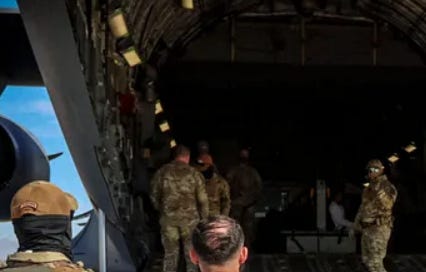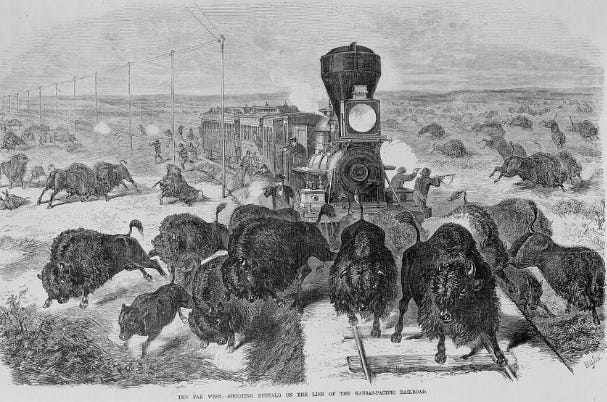The words transmitted by Samuel Morse between Washington and Baltimore, both changed and foretold the trajectory of humanity. Near instantaneous communications over distances faster than horse or sail was a departure from the nature of humanity’s existence to that point. On terra firma, trains were having the same effect for transport. The words at the time must surely have contemplated both what had been done already as well as what would be done in the furtherance of revolutionary industrialization. From just our information wrecked present, what hath God wrought indeed. Of concern her, the words presaged a particularly wretched turn as the new economy created the industrialized logistics of inhumanity, and described a damning question and answer, which was already bad and would only get worse.
I argue most frequently for the redemptive strategic character of Logpower. Delivering succor is powerful beyond the contemplation of most strategists. But I also know its worst side applied to the least. The relationship between means and barbarity is no aberration in the history of martial logistics. Western Enslavement was carried on the back of maritime power. In every respect, logistics have figured in the worst of military history. The Industrial Era, however, has its own character of inhumanity, most grimly demonstrated in its efficiency with mass.
This piece is difficult to write. But it needs to be said, and you, the reader, need to look at it. Because the planes are flying to Gitmo and beyond, while they should be doing the “Berlin 2: Airmobility and the Life Strategy” in Ukraine. The US should be materially aiding the liberation by delivering non-military aid to support civilians by air directly to where it is needed in Ukraine. Doing so, more importantly, in direct defiance of Putin, daring him to escalate against Strategic Succor. He would not. And that material support would hasten the end of the war.
That is not our current reality.
Nor has this been our consistent past. Americans at war and in conflict have too frequently, and too easily, unleashed the brutality of dark logistics upon hors de combat. Washington’s forces in Western Pennsylvania. * destroyed local crops to deepen the effect of the military campaign against the British aligned tribal forces. As a nation, we began in horrors of destructive logistical warfare that we would carry forward into posterity.
The brutality towards indigenous cultures living across the continent from the dawn of the American Republic is an imperial campaign of conquest for the ages. The many ways their populations and societies were reduced followed ancient paths of destruction. However, the 19th century elimination of the bison upon the American Plains represented something new. Industrial slaughter. While the barbaric forced march displacements of the people were a depravity of another age, the rise of the reliably powered machine, and mass, consistent production enabled the application of the worst of man at otherwise unknown scales. The expanding nation and transcontinental mass transport of the growing industrial and agricultural output could not survive alongside roving herds of massive ruminants, especially when those beasts sustained the life of the societies which also stood in the way. Slaughter of the animals by agents of the railroad companies and the Frontier Army paired itself to the industrialization of transport and arms production, to a gruesomely effective end. In combination with the campaigns against the tribes and their displacement, industrial logistics changed a continent.
Whenever industrial logistics has served man’s inhumanity, it has reigned supreme. In WWI, it delivered men and munitions in such numbers as to alter the demographics of the continent like the worst plagues of history. The slaughter of European generations was carried out in a relatively small, tightly defined boxes of death, as if a great factory of efficient carnage.
And again, within a generation, the capabilities and capacity of the industrial maw devoured human life at a pace and volume we cannot comprehend. With efficiency excellence and the application of banal processes and activities, humans were destroyed by the million. Most of all, for its allusion to the totality of industrialized warfare, I am haunted most of all by the rail to Auschwitz that mark its place within the complex system of barbarity. The well-sited and primed machine of death leading to and from that lonely, innocuous bit of track.
Berlin 1950 was a small repayment by industrial logistics against that debt. And all the ultimately miniscule aid delivered by this capability since then. We all know we could do more. But we do not pay heed to logistics’ redemptive power sufficiently. We scorn the value of succor and constructive participation in global crises. We still cling like angry children to small notions of power and fear. Lethality is the guide of too many.
And so I despair in ways beyond description as the worst unfolds in the dark logistics of airmobility and ethnic cleansing. As American logistics power retreats from any semblance of humanity with the de factor destruction of USAID and other policy indicators from the Trump administration, and its fullest capacity is turned to our worst depravities, the scale of what might be wrought will be incomprehensible even to God.
Notes:
* Wyoming Campaign was conducted against the Anglo-Iroquois forces in western New York and Pennsylvania, one portion of Washington’s strategy in this campaign was to destroy the native agriculture upon which the British Army relied for provisions. The journal of Lieutenant Obadiah Gore, an officer serving in that campaign, chronicles the daily destruction of corn and a vast multitude of other provisions. (R.W.G. Vail, ed., The Revolutionary Diary of Lieut. Obadiah Gore, Jr., New York Public Library: New York, (1929), pp. 17-30.)







